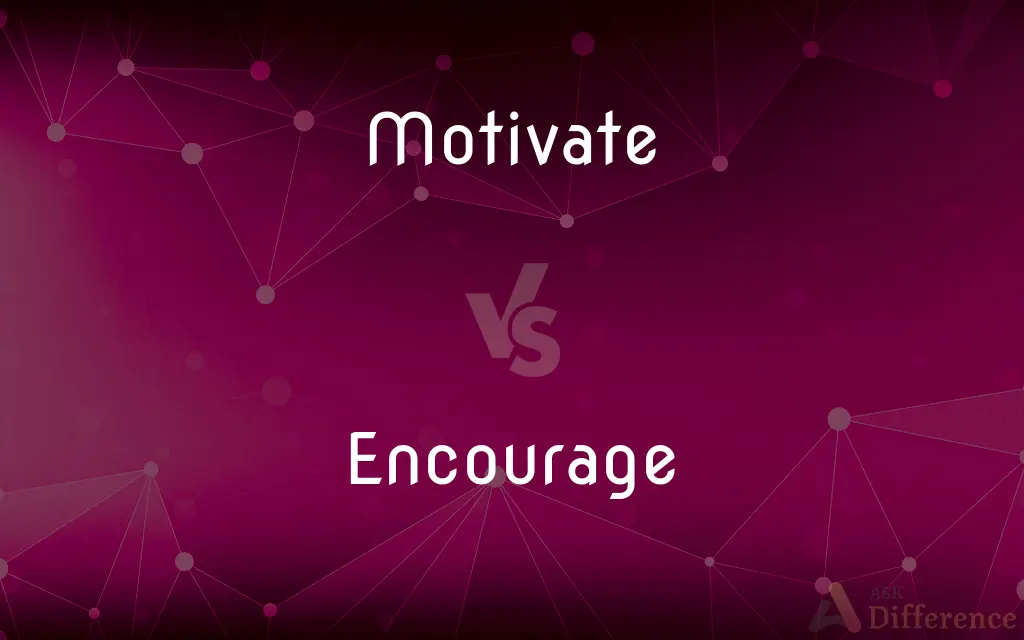Motivate vs. Encourage — What's the Difference?
Edited by Tayyaba Rehman — By Fiza Rafique — Updated on March 9, 2024
Motivate refers to driving someone to take action, often by appealing to their desires or goals, while encourage is about offering support and confidence to someone, making them feel more willing to act.

Difference Between Motivate and Encourage
Table of Contents
ADVERTISEMENT
Key Differences
Motivation involves stimulating someone's desire or willingness to achieve a goal or perform a task. It's about tapping into internal or external factors that propel a person to take action, such as personal ambitions, rewards, or the inherent satisfaction of completing a task. Encouragement, on the other hand, is about providing emotional support, confidence, or hope to someone, often by expressing belief in their abilities or the value of their efforts, which makes them feel more capable and supported in their endeavors.
While motivation can be sparked by a variety of incentives, including tangible rewards, personal growth opportunities, or the avoidance of negative consequences, encouragement is more about emotional and moral support. For example, a coach might motivate an athlete by highlighting the personal and professional benefits of winning a competition, whereas encouragement would involve reassuring the athlete of their capabilities and bolstering their spirit, especially in moments of doubt or difficulty.
Motivation can be intrinsic, coming from within the individual, driven by personal values or satisfaction, or extrinsic, influenced by external rewards or recognition. Encouragement typically doesn't involve external rewards but focuses on uplifting the individual through positive reinforcement, making them feel valued and understood.
In many contexts, motivation and encouragement work hand in hand. Effective leadership or coaching often involves both motivating individuals by aligning tasks with their personal drives and goals, and encouraging them by supporting their efforts and acknowledging their progress. This dual approach helps individuals not only to start an action but also to persist in the face of challenges.
Both motivation and encouragement are vital in personal, educational, and professional settings. Motivation pushes individuals to initiate and strive towards goals, while encouragement helps sustain morale and resilience, ensuring ongoing effort and helping individuals to navigate setbacks or challenges.
ADVERTISEMENT
Comparison Chart
Definition
Stimulating someone's desire to take action
Offering support and confidence
Focus
Desires, goals, rewards
Emotional support, belief in abilities
Type of Drive
Can be intrinsic or extrinsic
Primarily emotional and psychological
Outcome
Initiates and directs action towards a goal
Boosts morale and willingness to continue
Key Element
Incentives, personal or professional benefits
Positive reinforcement, morale boosting
Compare with Definitions
Motivate
Drive action through personal or external incentives.
His passion for science motivates his relentless research.
Encourage
Give support, confidence, or hope to someone.
Her mentor encouraged her during challenging times.
Motivate
Encourage a decision or action by highlighting benefits.
The coach motivated the player by outlining the path to victory.
Encourage
Reassure someone of their capabilities.
They encouraged him by reminding him of his past successes.
Motivate
To stimulate interest or enthusiasm for doing something.
The promise of a bonus motivated the team to exceed their targets.
Encourage
Foster a positive environment for growth or action.
The teacher encouraged creativity in her classroom.
Motivate
Inspire someone to achieve their goals.
Her success story motivated others to pursue their dreams.
Encourage
Promote a course of action through emotional support.
Friends encouraged her to share her artwork publicly.
Motivate
Elicit a behavior through rewards or consequences.
The fear of failure motivated him to study harder.
Encourage
Boost someone's willingness to continue an effort.
The applause encouraged the performer to give an encore.
Motivate
To provide with an incentive or a reason for doing something; impel
What motivated you to get a new job? Their criticism is motivated by jealousy.
Encourage
To inspire with hope, courage, or confidence.
Motivate
To cause to be enthusiastic
The coach motivated his players with an inspiring pep talk.
Encourage
To give support to; foster
Policies designed to encourage private investment.
Motivate
(transitive) To provide someone with an incentive to do something; to encourage.
The weekly staff meeting was meant to motivate employees.
Encourage
To stimulate; spur
Burning the field to encourage new plant growth.
Motivate
(transitive) To animate; to propel; to cause to take action
He was motivated purely by self-interest.
Steam-motivated pumps are used in manufacturing.
Encourage
To mentally support; to motivate, give courage, hope or spirit.
I encouraged him during his race.
Delia's coach encouraged her to focus on the positives.
Motivate
To provide with a motive; to move; impel; induce; incite.
Encourage
To spur on, strongly recommend.
We encourage the use of bicycles in the town centre.
We encourage you to cycle instead of taking the car.
Motivate
Give an incentive for action;
This moved me to sacrifice my career
Encourage
To foster, give help or patronage
The royal family has always encouraged the arts in word and deed.
Encourage
To give courage to; to inspire with courage, spirit, or hope; to raise, or to increase, the confidence of; to animate; enhearten; to incite; to help forward; - the opposite of discourage.
David encouraged himself in the Lord.
Encourage
Contribute to the progress or growth of;
I am promoting the use of computers in the classroom
Encourage
Inspire with confidence; give hope or courage to
Encourage
Spur on;
His financial success encouraged him to look for a wife
Common Curiosities
Can extrinsic motivation be as effective as intrinsic motivation?
Extrinsic motivation can be powerful, especially in the short term, but intrinsic motivation is often more sustainable for long-term engagement and satisfaction.
Can motivation exist without encouragement?
Yes, motivation can stem from personal desires or external rewards, independent of encouragement.
Can too much encouragement be detrimental?
Over-encouragement without genuine progress can lead to complacency or unrealistic expectations, so it's important to balance support with realistic feedback.
Is encouragement always positive?
Encouragement is generally positive, aimed at uplifting and supporting someone, though its effectiveness can depend on the individual's perception.
Is one more important than the other in achieving goals?
Both are important; motivation drives action and direction, while encouragement helps maintain morale and persistence through challenges.
Can encouragement lead to motivation?
Yes, encouragement can boost self-esteem and confidence, potentially leading to intrinsic motivation as the individual feels more capable and supported.
How do motivation and encouragement differ in a classroom setting?
In education, motivation might involve grades, achievements, or future opportunities, while encouragement involves supporting students through challenges, praising effort, and fostering a positive learning environment.
How do leaders effectively use both?
Effective leaders identify individual drives to tailor motivation strategies and provide consistent encouragement, recognizing efforts and fostering a supportive atmosphere.
How can parents balance motivation and encouragement for children?
Parents can motivate by setting clear expectations and rewards, and encourage by praising efforts, supporting through difficulties, and emphasizing the value of perseverance.
Can motivation and encouragement be self-directed?
Individuals can motivate themselves through personal goals and self-discipline, and self-encouragement can come from positive self-talk and reflecting on personal achievements.
Are there cultural differences in how motivation and encouragement are perceived?
Yes, cultural values and norms can influence what motivates individuals and how encouragement is expressed and received.
What role does feedback play in motivation and encouragement?
Feedback is crucial in both, providing a basis for motivating through goal setting and performance improvement, and for encouragement by recognizing efforts and achievements.
Can motivation be harmful?
Misguided or excessive motivation, especially if solely extrinsic, can lead to burnout, stress, or prioritizing rewards over genuine interest or ethical considerations.
How do motivation and encouragement interact in team dynamics?
In teams, motivation aligns individual efforts towards common goals, while encouragement fosters collaboration, resilience, and a positive team spirit.
How do motivation and encouragement affect resilience?
Motivation provides a reason to overcome obstacles, while encouragement builds the emotional and psychological resilience needed to face challenges.
Share Your Discovery

Previous Comparison
Geek vs. Hacker
Next Comparison
Bustler vs. HustlerAuthor Spotlight
Written by
Fiza RafiqueFiza Rafique is a skilled content writer at AskDifference.com, where she meticulously refines and enhances written pieces. Drawing from her vast editorial expertise, Fiza ensures clarity, accuracy, and precision in every article. Passionate about language, she continually seeks to elevate the quality of content for readers worldwide.
Edited by
Tayyaba RehmanTayyaba Rehman is a distinguished writer, currently serving as a primary contributor to askdifference.com. As a researcher in semantics and etymology, Tayyaba's passion for the complexity of languages and their distinctions has found a perfect home on the platform. Tayyaba delves into the intricacies of language, distinguishing between commonly confused words and phrases, thereby providing clarity for readers worldwide.















































